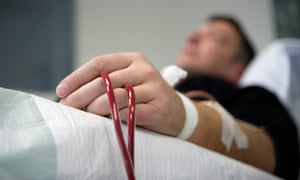
The country’s leading health organisations, including those representing doctors, nurses, surgeons and mental health charities, have called on the government to confirm it will abide by its duty to “do no harm” to public health after Brexit.
A letter signed by 29 health organisations and published in the Guardian expresses concern over the threat of a no-deal Brexit “exacerbating the devastating consequences of health inequalities”.
The groups challenge the government to publish “all assessments it has undertaken of the impact of different Brexit scenarios on health”. Sources in the health sector said recently they could find no evidence that the government had done any detailed analysis.
They also call on the government to establish a system for monitoring any impacts on health from Brexit.
The letter’s signatories, which include the Faculty of Public Health, Royal College of General Practitioners, Mind, Cancer Research UK and the British Medical Association’s public health medicine committee, note that Brexit is “proceeding at a time when the long-term improvement in life expectancy has slowed”.
They say they are concerned about the “public health of all four nations of the United Kingdom”. In some age groups it has “gone into reverse” while “the most vulnerable in our population face growing insecurity of income, employment and even food”. They add: “We believe that all of these will be exacerbated by a no-deal Brexit.”
After a campaign led by the Faculty of Public Health, Theresa May’s government confirmed in May 2018 that the EU public health duty “to ensure a high level of health in all policies” would be maintained.
The organisations have now called on Boris Johnson to renew that commitment.
The letter echoes concerns raised last week by a group of health academics who warned that a downturn in socio-economic circumstances caused by a no-deal Brexit for the most vulnerable in society could lead to a greater risk of untreated disease.
They believe the incidence of communicable diseases such as TB and HIV are at risk of increasing in a no-deal scenario.
Separately, the UK’s leading kidney patient charity has warned that most of the 25,500 kidney patients relying on haemodialysis will no longer be able to travel to the EU following a no-deal Brexit.
The treatment, which kidney patients undergo multiple times a week, is currently covered by the EU health insurance card reciprocal healthcare system, but in the case of no deal that would no longer be valid, leading to “crippling costs of treatment”.
Fiona Loud, the policy director at Kidney Care UK, said this was “simply not acceptable” for patients who travelled for business, family visits or holidays.
“Every kidney patient should be able to travel but if we do not have reciprocal healthcare arrangements with the EU post-Brexit this will be severely curtailed for those on haemodialysis,” she said. “With the UK still to reach healthcare agreements with any EU countries, patients have been left in limbo. With less than two months to go thousands of kidney patients still do not know if they will be able to travel in Europe after Brexit.”
[“source=theguardian”]



